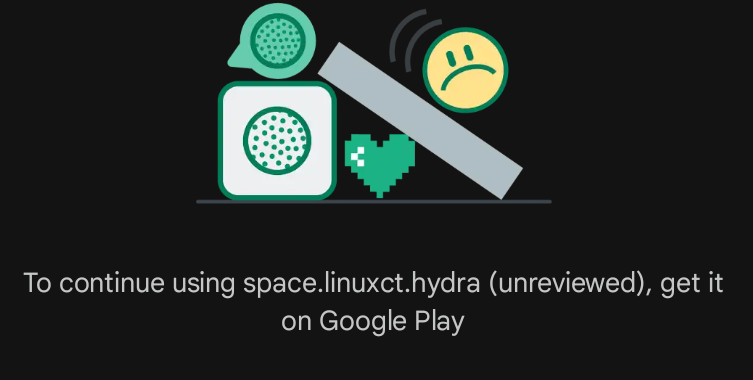- cross-posted to:
- [email protected]
- [email protected]
- [email protected]
- cross-posted to:
- [email protected]
- [email protected]
- [email protected]
You might sideload an Android app, or manually install its APK package, if you’re using a custom version of Android that doesn’t include Google’s Play Store. Alternately, the app might be experimental, under development, or perhaps no longer maintained and offered by its developer. Until now, the existence of sideload-ready APKs on the web was something that seemed to be tolerated, if warned against, by Google.
This quiet standstill is being shaken up by a new feature in Google’s Play Integrity API. As reported by Android Authority, developer tools to push “remediation” dialogs during sideloading debuted at Google’s I/O conference in May, have begun showing up on users’ phones. Sideloaders of apps from the British shop Tesco, fandom app BeyBlade X, and ChatGPT have reported “Get this app from Play” prompts, which cannot be worked around. An Android gaming handheld user encountered a similarly worded prompt from Diablo Immortal on their device three months ago.
Google’s Play Integrity API is how apps have previously blocked access when loaded onto phones that are in some way modified from a stock OS with all Google Play integrations intact. Recently, a popular two-factor authentication app blocked access on rooted phones, including the security-minded GrapheneOS. Apps can call the Play Integrity API and get back an “integrity verdict,” relaying if the phone has a “trustworthy” software environment, has Google Play Protect enabled, and passes other software checks.
Graphene has questioned the veracity of Google’s Integrity API and SafetyNet Attestation systems, recommending instead standard Android hardware attestation. Rahman notes that apps do not have to take an all-or-nothing approach to integrity checking. Rather than block installation entirely, apps could call on the API only during sensitive actions, issuing a warning there. But not having a Play Store connection can also deprive developers of metrics, allow for installation on incompatible devices (and resulting bad reviews), and, of course, open the door to paid app piracy.



“This shit” was said in the context of a society exactly opposite to anglosphere, where being “poor” is an indulgence for violating every moral rule, every promise, every obligation and every law.
More than that, it was said about the exact people who are, relatively speaking, not poor, rather almost privileged, but are hateful and envious of everyone actually doing useful work, and consider corruption good because in their opinion a bureaucracy worker stealing something entrusted to them is “a respected in the society person collecting rent from their position” or something like that.
The profession of a schoolteacher in Russia pays shit, which is why 3 kinds of people want that - those who are too dumb for other work, those who are idealistic, and those who want to feel that they are important and powerful (power over children) even more than to be paid well.
There are more people of the 2nd kind than you think, but those were of the 3rd undoubtedly. 1st kind is almost extinct - it’s not hard to find a job that pays better, if you don’t want power over children.
I think it’s clear how the 3rd kind intersects with sympathies to sociopathic behavior, and sympathies for corruption and organized crime.
EDIT: Oh, I just realized you thought they were bootlickers and hateful of poor people in this memory of mine. No, they considered that BS to be good for poor people. Basically hateful of capitalism most when it’s many small businesses honestly competing, but thinking oligopoly and state capitalism would be better. They considered me to be on the side of some “rich” people who hurt the poor. While big company owners and such were not, because they are apparently doing lots of charity etc and are respected people. So the “rich” they’d hate would be the “middle class”, not the “boss class”.